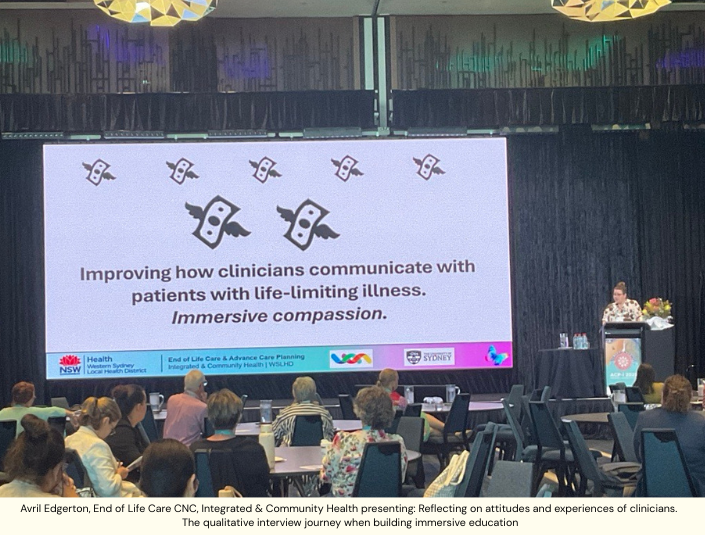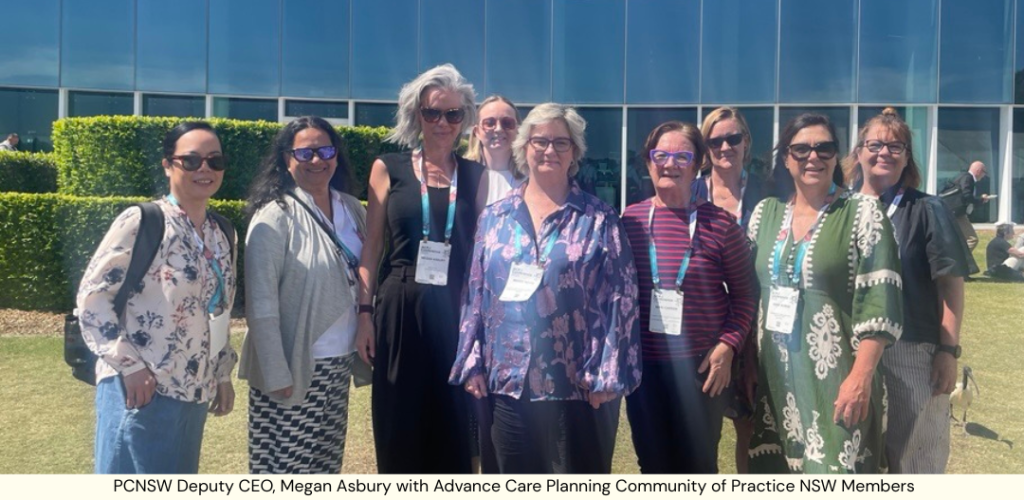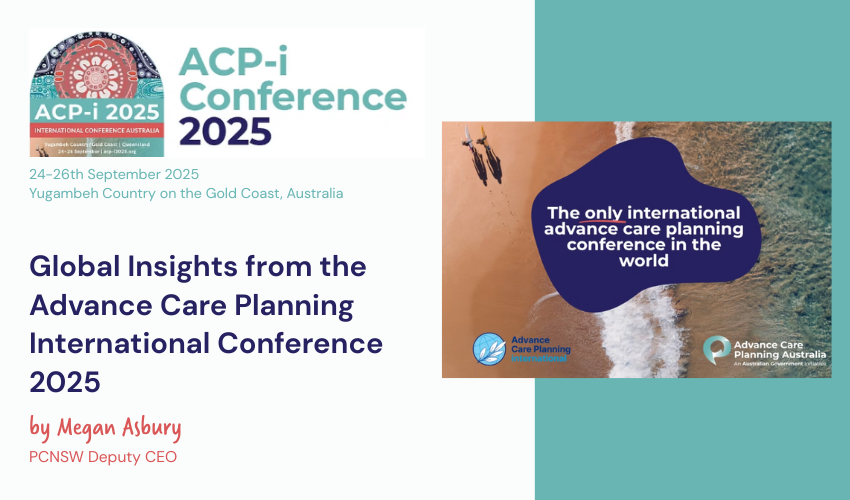Attending the 9th Advance Care Planning International Conference (ACP-i 2025) on the Gold Coast was an amazing opportunity to connect with clinicians, academics and researchers from around the world. The theme, “Are we there yet?” encouraged honest reflection on how far we’ve come, and how far we still have to go, in embedding advance care planning (ACP) as a cornerstone of person-centred palliative care.
Across the keynotes and research sessions, one clear message emerged: effective Advance Care Planning relies on two critical aspects – how we communicate and support decision-making and how systems and structures enable people to plan ahead.
Finding the Words: Including Every Voice in the Conversation
In her keynote “Finding the Words”, Laura Chanda, a Senior Speech-Language Pathologist, reminded delegates that communication is central to every aspect of ACP. Her presentation focused on supporting people with progressive speech or language difficulties to participate fully in decisions about their care.
Laura emphasised that shared decision-making must be guided by what patients want to know — not what clinicians think is best for them. She showcased practical tools that make complex information accessible, these included:
- Printed prompt lists of questions,
- Decision aids outlining risks and benefits,
- Option grids to help patients choose what to hear more about, and
- Evidence summaries written in plain, clear language.
Laura also demonstrated the use of adaptive software and Aphasia-friendly formats to tailor information to different literacy levels. Importantly, she stressed that people with disabilities or medical diagnoses can still have decision-making capacity. Clinicians must consider the context — the time of day, environment, anxiety or medication effects — and use frameworks like the SPIKES protocol to create conditions for inclusion.
Her message was simple but profound:
“People with communication challenges still want to be part of the conversation when it comes to ACP — so please include them.”
Supporting Autonomy after Brain Injury
Professor Emeritus Jacinta Douglas expanded on this theme in her plenary on ACP in the context of acquired brain injury (ABI). She challenged the assumption that cognitive or communication changes reduce a person’s right to participate in decisions about their own care.
Drawing on the Convention on the Rights of Persons with Disabilities (CRPD), Professor Douglas highlighted that everyone retains legal capacity, provided they receive support for decision-making. She distinguished between a person’s will — their enduring values — and their preferences, which may vary with context.
Her La Trobe Practice Framework and resources such as supportfordecisionmakingresource.com.au and enablingriskresource.com.au provide clinicians with evidence-based approaches to tailor supported decision making to each individual’s needs. These tools remind practitioners that enabling autonomy often means enabling risk — respecting choice even when it involves uncertainty.
Who Plans Ahead — and Who Gets Left Behind?
In a concurrent research session, Associate Professor Joel Rhee from the International Centre for Future Health Systems presented findings from the NSW 45 and Up Study, exploring socio-demographic and clinical factors influencing ACP uptake.
His analysis revealed that those most likely to complete ACPs or Advance Care Directives (ACDs) were university-educated women aged over 60, with private health insurance and multiple comorbidities. Having a will strongly correlated with having an ACD, though interestingly, people without partners were more likely to formalise directives than those in relationships.
A/Prof Rhee raised concern about the socio-economic gradient in ACP engagement: people with lower education and income levels were far less likely to plan ahead. He questioned how limited health literacy and restricted access to health or legal services may contribute to this disparity — pointing to a need for more inclusive, community-based strategies to support ACP.
Do We Really Understand Each Other’s Wishes?
Following on from A/Prof Rhee’s insights, Dr Clement Meier from the University of Lausanne, Switzerland presented his study “Mirror of the Mind: How Personal Preferences Shape Perceptions.” His research explored how accurately couples understand each other’s care preferences, using data from the SHARE study of adults aged 58 and older.
By comparing partners’ answers about their own and each other’s care wishes, the study revealed that most couples do not share identical preferences. When differences exist, individuals often project their own views onto their partner — a phenomenon known as projection bias.
Dr Meier’s findings challenge the assumption that long-term relationships automatically ensure accurate understanding in proxy decision-making. His work suggests that ACP interventions for couples should include structured prompts and decision aids to make implicit assumptions explicit and ensure that each partner’s true wishes are understood and respected.
My reflections
The combined messages from these sessions reinforce a broader truth about Advance Care Planning:
- Equity matters — social and economic barriers still determine who plans ahead.
- Communication matters — every person, regardless of speech ability, literacy or cognitive change, deserves tools that make their participation possible.
- Relationships matter — even those closest to us may not know our wishes unless we have explicit, supported conversations.

This reflection is just a small sample of the wonderful presentations from this conference. It was great to also see Palliative Care NSW Members, Jon San Martin, Josephine Clayton and Avril Edgerton present across various concurrent sessions.
The global exchange at ACP-i 2025 showcased innovative ways to make ACP inclusive, evidence-based and truly person-centred. Whether through communication aids, supported decision-making frameworks or policy reforms that address inequity the challenge remains the same: ensuring that everyone has both the opportunity and the support to express what matters most.

For those working across aged care, primary care and palliative care, these lessons remind us that advance care planning is not simply about documents — it’s about dignity, dialogue and the shared responsibility to listen. I encourage everyone to further explore how they facilitate Advance Care Planning in their own practice and how it could be more inclusive and effectively embedded.
Megan Asbury,
PCNSW Deputy CEO.


